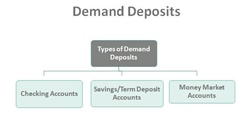
Table of Contents
What is an Interbank Deposit?
Interbank deposits are Bank-to-bank transfers from one bank's funds to another. Banks use these deposits when they need to obtain funds quickly. The holding bank must open a due account or a General Ledger account containing funds payable to a third party.

The bank that holds the due account is called a holding account. In these transactions, one institution lends money to another institution for a short period in exchange for interest payments. These accounts are typically liquid and accessible by the depositor and the receiving bank on regular business days.
What is the Interbank Interest Rate?
It is the interest rate on banks' loans and deposits that banks charge each other to borrow money. It is determined by maturity, Market trends, and establishment credit scores. This interest rate changes every day depending on the market demand.
The basic idea behind the interbank rate is to bring liquidity into the market so that traders can make better decisions regarding their investments. These rates are typically much lower than bank loan rates that you see advertised on billboards and in magazines. This is because interbank interest rates don't include any of the fees or costs that a regular customer pays when borrowing money. A customer will never get the interbank rate on a loan. The lowest rate is given exclusively to the largest and most creditworthy financial organisations.
Talk to our investment specialist
Interbanking Designations
If the deposits occur between the domestic banks, the bank that receives the funds is designated as a corresponding bank. But if a foreign bank is involved, then the correspondent bank's designation changes to either Nostro or Vostro.
The bank which has the due account at the holding bank calls its account a Nostro account while the holding bank calls it a Vostro account. Nostro means "our account on your ledgers," and Vostro means "your account on our ledgers." Both Nostro and Vostro refer to the same account but from two different perspectives.
Additional Information
Deposits and loans are two of the various transactions that provide the market with liquidity. These deposits are a part of the current national banking system in India. This system is similar to the interbank lending and borrowing of funds in the global financial markets.
These deposits help the local banks obtain access to overseas financial markets and serve international clients without opening foreign branches. Banks and other financial institutions can trade currencies in a safe and secure environment in the interbank market.
Smaller trading parties and individual retail investors are excluded from this system. Interbank lending allows banks to manage liquidity and meet the required reserve requirements.
Conclusion
With an increasing number of financial institutions seeking to process more and more money, the interbank payment process has become crucial. The banks use different methods and technologies to ensure that payments are made fast and secure. Interbank deposits are usually quick and reliable, which helps to maintain the market's liquidity.
All efforts have been made to ensure the information provided here is accurate. However, no guarantees are made regarding correctness of data. Please verify with scheme information document before making any investment.












